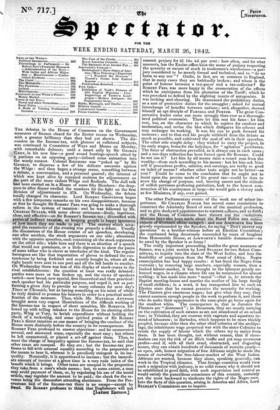The other Parliamentary events of the week are of minor
im- portance. Sir CHARLES NAPIER has moved some resolutions to construct the Admiralty Board of men of the nautical profession, and to give dockyard appointments to warrant-uMeers, and so forth; and the House of Commons have thrown out the ."solutions. Motions have also been made about the Rural Police and siinii4; Objects Of dilettArittatee-rnongers : and one ASHWORTH has been gravely reprimanded by the Speaker, for saying "Don't answer any questions" to a brother-witness before an Election Committee ; the reprimand being decorously succeeded by roars of laughter from Honourable House, at AsnwoRTR's humble demeanour—to be awed by the Speaker is so funny ! The really important proceeding, besides the great measures of finance, was a joint motion by Lord STANLEY for two Select Com- mittees, to inquire into the state of the West Indies, and into the feasibility of emigration from the West coast of Africa. Negro emancipation has had happy results : it has freed the Negro from restraint ; by removing large numbers, especially women, from a limited labour-market, it has brought to the labourer greatly en- hanced wages, in a climate where life can be maintained for almost nothing; it has made hint more " moral"—that is, lie attends the Baptist meeting-house and marries the mother of his large family of small children ; in a word, it has transported him to such an Elysian state that he cannot perceive the necessity for working. The Planters give enormous wages; but give what they may, they cannot summon enough people to the work to perform it, and those who do make their appearance in the cane-piece go home again for the smallest whim. The consequence is, that in Jamaica the Planters are "distressed " ; in Demerara, they are mostly carrying on the cultivation of such estates as are not abandoned at an actual loss; in Trinidad, they are overrun with vagrants and squatters in- stead of labourers ; in Barbados, which happens to be more thickly peopled, because older than the other chief colonies of the archipe- lago, the inhabitants wage perpetual war with the sister Colonies to retain the supply of labour which the others try to entice from them. It has been thought, not without reason, that if slave- dealers can run the risk of an illicit traffic and yet reap enormous profits—and if, with all their cruel, obstructed, and disgusting means, they can obtain hundreds of thousands of recruits yearly— an open, safe, honest migration of free Africans might be made the means of recruiting the free-labour-market of the West Indies. Africans are wanted, because they alone, speaking generally, can work in the Tropical climates. That foreign countries would view such a migration with jealousy, is no solid reason why it should not be established in good faith, with such supervision and control as would satisfy the punctilious conscience of this country, certainly not the most backward to vindicate the rights of the Negro race. Into the facts of this question, arising in America and Africa, Lord SrAtuar's Committees are to inquire.


























